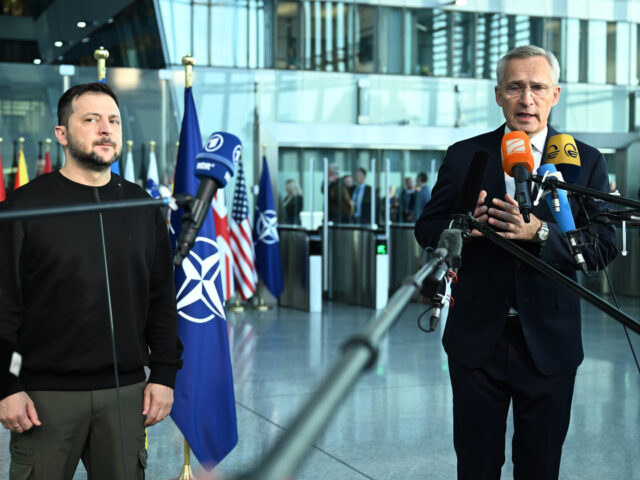The West needs to prepare for the conflict with Russia to last for “decades” and therefore must ramp up arms production quickly, NATO Secretary General Jens Stoltenberg said.
“NATO is not looking for war with Russia. But we have to prepare ourselves for a confrontation that could last decades,” Stoltenberg warned this weekend in an interview with Germany’s Welt am Sonntag newspaper.
Thus, the NATO chief called for Western nations to increase production of weapons and ammunition, claiming that this is the only way in which Europe’s safety can be guaranteed and for Ukraine, which is not a member of the alliance, to continue its war with Russia. European market economies need to ink more deals with defence contractors, Stoltenberg proclaimed while urging that “they need to be signed faster”.
“The economy and industrial strength of the West far dwarfs that of Russia. So we have the means to surpass Russia in both production and investment,” the former Norwegian prime minister said, explaining that if the current opportunity is missed, Russia would benefit and Europe’s security would be at risk.
Despite Russia’s Vladimir Putin’s insistence during the interview with American journalist Tucker Carlson that Moscow has no intention of invading Poland, acknowledging that such a move would spark a Third World War, Stoltenberg warned that “if Putin wins in Ukraine, there is no guarantee that Russian aggression will not spread to other countries.”
The best defence for Europe then, he argued, is to invest in the militaries of Ukrainian and NATO members, saying: “Deterrence only works if it is credible. As long as we invest in our own security and remain united, we will continue to deter any form of aggression.”
Europe is ‘Entering an Era of Wars’, Top Security Forum Warns https://t.co/nl9Xw9zLt4
— Breitbart London (@BreitbartLondon) December 19, 2023
The left-wing globalist politician said that he recognised that many European nations prefer to spend money on socialised medicine, welfare programmes, and education, but said that “our schools, our hospitals and our industries are also protected by our armed forces. That’s why it’s important to continue investing in our security.”
Many European nations, most notably Germany, the continent’s top economy, have long failed to live up to their NATO spending commitments, which require every member state to devote at least two per cent of their respective GDP towards military funding.
This issue was persistently raised by former U.S. President Donald Trump, who chided Germany for signing large oil and gas deals with Russia while demanding that American taxpayers foot the bill to protect them from potential Moscow aggression.
Trump’s lobbying efforts to pressure NATO allies to finally meet their obligations, which were often characterised in the legacy media as threatening the stability of the alliance, were credited by Secretary General Stoltenberg in 2019 as having been instrumental in convincing Europe and Canada to increase their NATO spending by $100 billion.
Donald Trump has said he would 'encourage' Russia to attack any Nato member that fails to pay its bills. https://t.co/skp3jzdZXT pic.twitter.com/Z2dh30u400
— Sky News (@SkyNews) February 11, 2024
This week, the former president once again drew the ire of the legacy media over a story he recounted at a campaign rally in South Carolina about an interaction he had with a NATO member state president.
Trump told the audience that he warned the unnamed leader that if they failed to pay their NATO obligations, he would not abide by Article 5 of the alliance’s treaty, which demands that all states come to the defence of any fellow member that is attacked. Trump went on to relay that he told the unnamed president that he “would encourage” Russia to “do whatever the hell they want” under such circumstances.
Despite clearly speaking in the past tense, multiple establishment media outlets characterised the story as a present and active call from the presumptive Republican presidential nominee for Russia to invade Europe.
The anecdote from Trump was also likely a mere explanation of his application of the “Madman Theory” on foreign relations, which observers have long noted was a hallmark of his presidency.
The strategy, first explained by Italian Renaissance political theorist Niccolò Machiavelli and formalised by U.S. President Richard Nixon, stipulates that if other leaders credibly believe you are acting on impulse and are willing to go to extremes to achieve your goals, they are more likely to cave to your demands. Demonstrating the apparent success of the strategy, Trump claimed in his rally on Saturday that “the money came flowing in” to NATO following his stark warning to the unnamed leader.
Although Stoltenberg previously acknowledged that Trump’s strategy had succeeded in increasing European military spending, the NATO chief condemned the former president’s comments on Sunday, saying: “Any suggestion that allies will not defend each other undermines all of our security, including that of the US, and puts American and European soldiers at increased risk.”
Trump Vindicated: Germany to FINALLY Pay NATO Spending Requirementshttps://t.co/qvavqZm45k
— Breitbart London (@BreitbartLondon) February 28, 2022

COMMENTS
Please let us know if you're having issues with commenting.